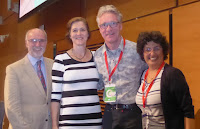The European Medicines
Agency has been holding a 2 day international workshop in London [11th -12th
December 2017] to define opportunities and challenges for a common health
data model in Europe. The expected outcome of the workshop was agreeing guiding
principles for the development of such a Common Data Model (CDM) in Europe,
including key criteria for validation in the context of regulatory
decision-making.
See more about the workshop
A common data model could help harmonise healthcare data across multiple data sets and provide a mechanism to conduct pan-European studies in a timely manner to address regulatory questions. At the same time, applying a common model to European data has multiple challenges. The meeting brought together regulators with academia, data holders and the pharmaceutical industry.
Sessions included talks from experts from North America and the European region discussing lessons learned and current challenges in very large current clinical data resources, regulatory verification and related issues. Common data model case studies included Sentinel – the Harvard-based FDA system for accessing patient data from health data partners across the USA and CNODES (the Canadian Network for Operational Drug Effect Studies) which can access data on 100 million patients – a similar scale to Sentinel.
The U.S. Food and Drug Administration's (FDA) Sentinel Initiative uses a common health data model to improve the FDA’s ability to identify safety issues for medical products. Sentinel actively surveys pre-existing electronic healthcare data from multiple sources.
Themes at the workshop included ensuring the relevance of CDMs to health policy, keeping timelines short, inter-operability, consent and related ethical issues, and careful internal and external validation of clinical definitions, data, software and analytical models.
From the perspective of health professionals, policy makers, regulators and the public, key future questions include whether clinical outcomes from common data models will be generalisable or only relevant to specific sub-populations based on geography, genetics, demographics and/or complex co-morbidity. In the era of precision medicine there is the clear need is to avoid “right” answers from the wrong clinical populations and “wrong” answers from the right populations.
Further key points to consider include the cost of CDMs and who should pay; and whether updating existing databases will be sufficient or will new, more robust databases be needed.
Future EACPT Congresses will be held in:
- 2019 Stockholm
- 2021 Athens
- 2023 Rotterdam
The EACPT was founded in 1993 - 24 years ago - and now includes as members all major national organisations for clinical pharmacology in Europe, as well as organisations from further afield internationally. The EACPT aims to provide educational and scientific support for the more than 4000 individual professionals interested in clinical pharmacology and therapeutics throughout the European region, with its congresses attended by a global audience. The EACPT also advises policy makers on how the specialty can contribute to human health and wealth.
Clinical Therapeutics, the Official Journal of EACPT
See more about the workshop
A common data model could help harmonise healthcare data across multiple data sets and provide a mechanism to conduct pan-European studies in a timely manner to address regulatory questions. At the same time, applying a common model to European data has multiple challenges. The meeting brought together regulators with academia, data holders and the pharmaceutical industry.
Sessions included talks from experts from North America and the European region discussing lessons learned and current challenges in very large current clinical data resources, regulatory verification and related issues. Common data model case studies included Sentinel – the Harvard-based FDA system for accessing patient data from health data partners across the USA and CNODES (the Canadian Network for Operational Drug Effect Studies) which can access data on 100 million patients – a similar scale to Sentinel.
The U.S. Food and Drug Administration's (FDA) Sentinel Initiative uses a common health data model to improve the FDA’s ability to identify safety issues for medical products. Sentinel actively surveys pre-existing electronic healthcare data from multiple sources.
Themes at the workshop included ensuring the relevance of CDMs to health policy, keeping timelines short, inter-operability, consent and related ethical issues, and careful internal and external validation of clinical definitions, data, software and analytical models.
From the perspective of health professionals, policy makers, regulators and the public, key future questions include whether clinical outcomes from common data models will be generalisable or only relevant to specific sub-populations based on geography, genetics, demographics and/or complex co-morbidity. In the era of precision medicine there is the clear need is to avoid “right” answers from the wrong clinical populations and “wrong” answers from the right populations.
Further key points to consider include the cost of CDMs and who should pay; and whether updating existing databases will be sufficient or will new, more robust databases be needed.
Future EACPT Congresses will be held in:
- 2019 Stockholm
- 2021 Athens
- 2023 Rotterdam
The EACPT was founded in 1993 - 24 years ago - and now includes as members all major national organisations for clinical pharmacology in Europe, as well as organisations from further afield internationally. The EACPT aims to provide educational and scientific support for the more than 4000 individual professionals interested in clinical pharmacology and therapeutics throughout the European region, with its congresses attended by a global audience. The EACPT also advises policy makers on how the specialty can contribute to human health and wealth.
Clinical Therapeutics, the Official Journal of EACPT



















